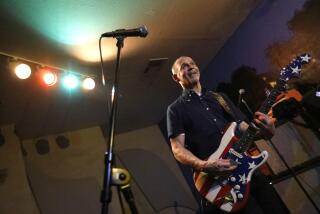Pop Music Review : Fogerty Shows His Creedence Credentials : A 90-minute benefit performance at the House of Blues includes many of the old songs, vitally rendered by a true rocker in his first formal concert in eight years.
- Share via
Organizers of the “Emergency Blues” benefit concert on Tuesday at the House of Blues had fun placing estimated values on some of the items at their silent auction.
Hey, the money’s for charity, so why not declare as “priceless” an autographed Mickey Mantle baseball cap or signed Ringo Starr drum skins? Even if we’re just talking three- or four-figure bids here.
But even Sting would have to chuckle if he saw his Tiffany key chain listed as priceless--and a concert-goer did laugh out loud when he saw an autographed T-shirt from Traffic, the tour bomb of the year, in that category.
There was no denying, however, that the evening’s music had a priceless quality: the first formal concert performance in eight years by John Fogerty, the former leader of Creedence Clearwater Revival and one of the greats of American rock.
Fogerty, who’ll be 50 next year, has only made about half a dozen stage appearances since his 1986 solo tour, but they were short sets, no more than three or four songs--as at the 1993 ceremony in which Creedence was inducted
into the Rock and Roll Hall of Fame.
By contrast, Fogerty and a three-piece band spent almost 90 minutes on stage Tuesday. Most of the time was devoted to Creedence-era songs, many of which he hadn’t played since the group broke up in 1972.
Looking eager and trim in black shirt and jeans, Fogerty opened with a tip of the hat to Creedence’s early days and roots by playing “Suzie Q” and “I Put a Spell on You”--’50s rock hits that Creedence reprised on its 1968 debut album.
But it was Fogerty’s songs that established Creedence as one of the premier groups in rock history--songs, from “Bad Moon Rising” and “Fortunate Son” to “Green River” and “Who’ll Stop the Rain,” that combined sometimes biting social observation with the energy and economy of ‘50s rock.
Watching Fogerty play guitar and sing with such authority Tuesday, it was hard to believe that he has been away from the rock arena for even a few weeks. Rock ‘n’ roll seems to run through the man’s veins--100%.
And the vitality of the music was mirrored in the celebration of the evening itself. In the spirit of that great American philosopher of the moment James Carville, it’s the music, stupid.
True enough: It’s the quality of the songs, fundamentally, that stands as the measure of most artists. Our appreciation of those songs, however, can be enhanced or lessened by the actions of the performer or the setting in which we hear them.
Nothing sounds more hollow than social protest by someone whose own behavior suggests compromise or corruption. At the same time, few factors highlight the liberating qualities of rock ‘n’ roll music as much as benefits.
That was evident at the Greek Theatre on Monday when Elton John began a four-night engagement that will raise an estimated $750,000 for the Elton John AIDS Foundation.
Although many of the songs John sang during the evening have been bigger hits for him, the most moving moment was John’s version of “The Last Song,” a tune he wrote in 1992 with lyricist Bernie Taupin about a father’s coming to terms with a son who is dying of AIDS. At the end of the number, John bowed his head softly, as if in silent prayer--a gentle punctuation mark that summarized the often lonely and heroic struggles surrounding AIDS.
Similarly, Fogerty’s spirited performance at the House of Blues mirrored the optimism and determination of the half-dozen women who organized the event. The show and auction raised more than $200,000 for Jamie Belmont, a Toluca Lake woman who underwent a recent bone marrow transplant, and Stop Cancer, a Los Angeles organization that awards research grants.
Although Bruce Springsteen and Paul Rodgers came out to join Fogerty on the night’s closing number, the emotional peak came earlier with a blistering version of “Fortunate Son.” Fogerty wrote it during the Vietnam War as a working-class attack on the way politicians and the wealthy were often able to wave the flag while getting their own children excused from battle.
Today, it stands equally as a testimony to the power of the individual to get things done, including, on this night, the kind of grass roots benefit efforts reflected in “Emergency Blues.” In this humanitarian setting, the pricelessness of Fogerty’s art was underscored all the more dramatically.
More to Read
The biggest entertainment stories
Get our big stories about Hollywood, film, television, music, arts, culture and more right in your inbox as soon as they publish.
You may occasionally receive promotional content from the Los Angeles Times.










